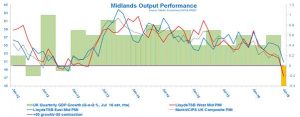Economists and academics, have said that the Midlands’ economy may prove resilient enough to withstand a sharp economic decline predicted by new figures released today (Monday August 8).
The Regional Purchasing Managers’ Index (PMI) released by Lloyds Banking Group and IHS Markit, reflects the national PMIs – predicting a potential steep downturn in the economy as a result of the vote to leave the European Union.
Experts at Birmingham City University and the Midland Economic forum have said that while the Midlands’ economy had slowed down the situation may be more complex and its industries may help it avoid such a stark outcome.
While the East Midlands slowed from 54.8 in June to 50.9 in July it remained positive, while in the West Midlands the fall from 51.9 in June to 47.5 in July was one of the weakest regional rates of deceleration.
The experts said that as the East and West Midlands’ economies had placed emphasis on manufacturing and export growth since 2010 it suggested the region may be well placed to benefit from the weaker pound.
It could also provide a boost to local production as imports become more expensive adding pressures to those who re-export, increasing the benefits of products sourced in the Midlands.
Professor Julian Beer, Deputy Vice-Chancellor at Birmingham City University, said: “The economic downturn indicated by the East and West Midlands PMIs are obviously disappointing, although given the shock of the vote to leave the European Union this is understandable.
“It is now vital however that Brexit not only means Brexit, but that Brexit means success.
“Key now is how the government will establish its Brexit negotiating objectives, and how the Midlands fits into that process. Ensuring the interests of the Midlands economy, notably our manufacturers and exporters will be critical to ensuring Brexit is a success and the current uncertainty is replaced by a positive actions to support the regional economy.
“It is also vital that we continue to support the strength and focus of the region’s Universities which play such a vital role in developing the skills and talents of the next generation of workers, who will be so central to the future of our economy in post-Brexit Britain.”
The Midlands enters the second half of the year from a position of strength following large expansion in its key automotive, aerospace, wholesale and logistics sectors – key areas of focus in terms of growth for the West Midlands Combined Universities (WMCU) which was launched recently.
The regional figures reflect the trend at national level with the manufacturing sector outperforming the services sector – largely due to export orders – reinforcing the reasons for the West Midlands outperforming the country as a whole.
Similarly figures in the recent IHS-Markit jobs report showed that whilst recruitment in the region fell for the first time since 2012, the fall was significantly less severe than the national average.
Professor Paul Forrest, Head of Research at Midlands Economic Forum, said: “The resilience of the Midlands economy is likely to be tested over the second half of the year as the implications of Brexit are digested.
“A new weaker trading band for Sterling, and the fact that current access to the EU market will remain in place for at least the next 2 years, will support regional export performance, with performance in the East and West Midlands forecast to exceed that achieved nationally this year and next.”

Birmingham City University recently joined forces with the University of Wolverhampton and Coventry University to create the West Midlands Combined Universities (WMCU), focusing on combining efforts to support economic growth across the Midlands region.
ENDS
